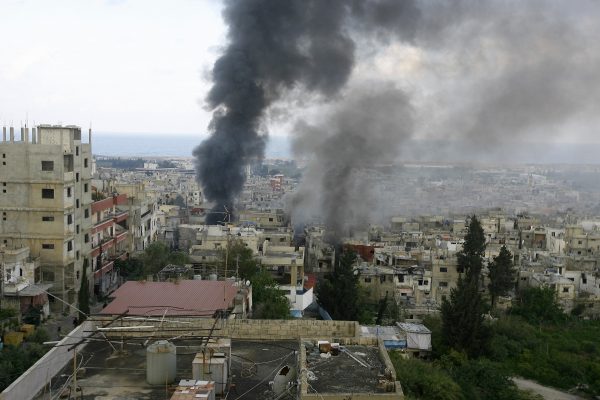
AIN EL-HILWEH, Lebanon (Reuters) – Palestinian leaders said on Tuesday they would break up an armed Islamist group involved in clashes with security forces inside the volatile Ain el-Hilweh refugee camp in southern Lebanon.
At least seven people have been killed since Friday as combatants have exchanged machine gun, rocket and mortar fire in the crowded camp near the coastal city of Sidon.
The situation was calmer on Tuesday though gunfire could still be heard in the camp, witnesses said.
The battles have pitted a joint security force including the Fatah party of Palestinian President Mahmoud Abbas and allied factions against the Sunni Islamist Badr group.
Fighting broke out after the security force sought to deploy throughout the camp and met resistance from the Badr group.
Fatah’s head in Lebanon said the security force would deploy in all areas of the camp with the aim of disbanding the Badr group and arresting its leader, Bilal Badr.
“Wherever the security find him, they must arrest him, present him to justice and hand him over to the Lebanese state,” Fathi Abu al-Aradat told a televised press conference in Sidon.
The incident has raised fears of spiraling violence in Ain el-Hilweh, which has seen intermittent clashes in recent months.
Lebanon’s Palestinian camps, which date back to the 1948 war between Israel and its Arab neighbors, mainly fall outside the jurisdiction of Lebanese security services. There are some 450,000 Palestinian refugees living in 12 camps in Lebanon.
Who is Bilal Badr?
Bilal Badr, an official from the Fatah al-Islam movement (an extremist Salafist organization linked to al-Qaeda) escaped an assassination attempt March 2013 by a masked assailant in the neighborhood of Ras al-Ahmar in the Lebanese Ain al-Hilweh refugee camp.
Fatah al-Islam has nothing to do with the Palestinian Fatah movement .
Badr has been living in Ain al-Hilweh camp for years, deemed to be the most important camp among all the Palestinian refugee camps inside and outside Lebanon. It is conventionally called “the capital of Palestinian exile.” The importance of this camp does not lie in its size — barely 1 square km. — but in the fact that it is home to a whole range of Palestinian groups and factions.
The al-Qaeda-affiliated groups took advantage of the Cairo accord that was signed in 1969 by infiltrating the camp over the past few years, and taking refuge there. These groups established “guest houses” in the camp and “sheltered” mujahedeen of all nationalities on their way back or on their way to fight in hot zones around Yemen, then in Iraq and now in Syria.
Since the beginning of the last decade, the Islamist influence in the Palestinian refugee camps in Lebanon has started to grow, especially in those found in Nahr al-Bared in the north and Ain al-Hilweh in the south, at the expense of Palestinian nationalist and other leftist factions.
The Fatah al-Islam group declared in 2008 Nahr al-Bared refugee camp an Islamist emirate after it expelled all other Palestinian factions. Chief among these was the Fatah-Arafat movement. This group, led by Shaker al-Absi, a convert from the doctrine of the Fatah movement to the Islamist jihadist Salafist ideology, had committed a massacre against Lebanese soldiers. This led the Lebanese army to besiege the camp and expel Absi and his group, which included volunteers from Asian and Arab nationalities.
Shaker al-Absi along long with Abu Musab al-Zarqawi, was sentenced to death in absentia by the Jordanian authorities for the 2002 murder of U.S. diplomat Laurence Foley in Amman. Syria rejected Jordan’s extradition request for ‘Absi and allegedly detained him in prison for a few years. In 2008 he resurfaced in Nahr al-Bared refugee camp, leading Fatah al-Islam in its month-long battle with the Lebanese Armed Forces–part of Assad’s plan to destabilize the Lebanese government, which the Syrian president describes as hostile to Syrian interests.
Reuters/YL

Leave a Reply
You must be logged in to post a comment.